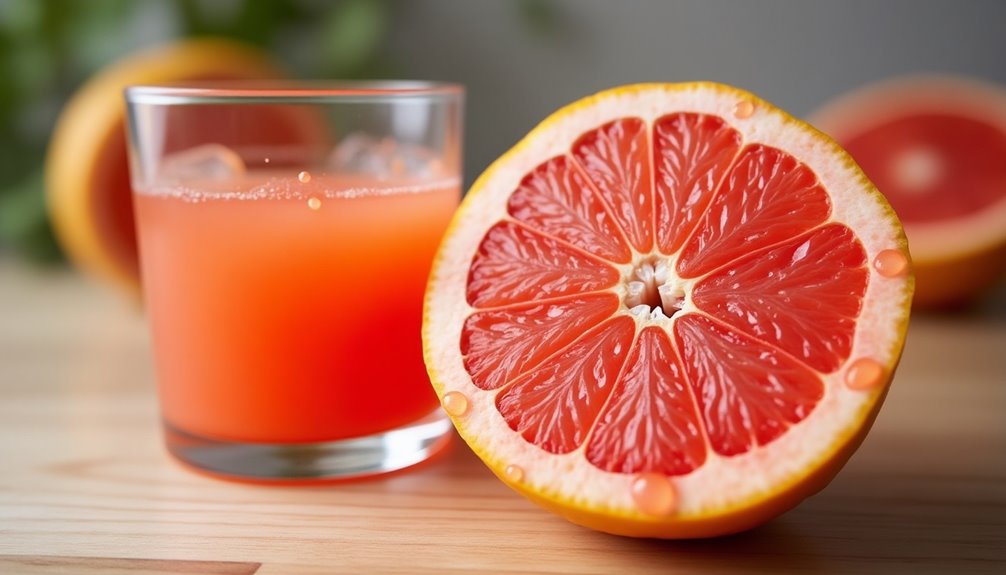One grapefruit usually gives you about 12 tablespoons, or 3/4 cup, of juice. If you want a full cup, you'll need roughly 1.25 grapefruits. Keep in mind that factors like size and ripeness can affect the juice yield. Choosing ripe, heavier grapefruits is a smart strategy for maximizing your juice. If you're curious about the best juicing techniques and tips for selecting grapefruits, you might find some helpful insights ahead.
Key Takeaways
- One grapefruit typically yields about 12 tablespoons or 3/4 cup of juice.
- Approximately 1.25 grapefruits are needed to produce 1 cup of juice.
- Juice yield can vary based on the grapefruit's size, variety, and ripeness.
- A pound of grapefruits yields around 1.5 cups of juice, containing about 1.5 to 2 fruits.
- Juicing techniques and tools can significantly impact the amount of juice extracted from each grapefruit.

Have you ever wondered how much juice you can actually squeeze from one grapefruit? If you've ever held one in your hand, you might've noticed its weight and the promise of refreshing juice inside. Typically, one grapefruit yields about 12 tablespoons or 3/4 cup of juice. So, if you're looking to gauge how much juice you can extract, you'll find that a single grapefruit provides a decent amount, but you might need a little more to fill your glass.
If you're aiming for 1 cup of grapefruit juice, you'll need approximately 1.25 grapefruits. This means that if you want to enjoy a full cup, you should be prepared to slice up more than just one fruit. The yield can vary depending on factors like the size and variety of the grapefruit, as well as its ripeness. A large, ripe grapefruit will typically yield more juice than a smaller or less ripe one. So, when you're at the store choosing your grapefruits, it's a good idea to consider these factors.
On average, a pound of grapefruits contains about 1.5 to 2 fruits, which can yield around 1.5 cups of juice. This is helpful to know if you're planning for a larger gathering or simply want to make a refreshing pitcher of juice for yourself. By calculating how many grapefruits you need based on the amount of juice you want, you can avoid underestimating or overestimating your grocery list.
When it comes to efficient juicing, you'll want to ensure that most of the rind is removed. This is important because the pectins in the rind can cause the juice to gel, which isn't what you're looking for when trying to enjoy a smooth, liquid refreshment. To maximize the amount of juice you extract, use a good juicer or even a hand-held citrus press. The right tools can make a significant difference in the efficiency of the juicing process.
Remember that the average juice yield isn't set in stone. Each grapefruit is unique, and the juiciness can change based on its variety. Some grapefruits are known for their juiciness, while others may not yield as much. Be prepared for slight variations. You might find that some grapefruits yield a bit more than expected, while others could fall short.
In the end, whether you're making breakfast, a cocktail, or just enjoying a refreshing drink, knowing how much juice one grapefruit yields can help you plan better. When you understand the relationship between the number of grapefruits and the amount of juice you want, you can whip up your favorite grapefruit concoctions without a hitch. So go ahead, grab some grapefruits, and get juicing!
Frequently Asked Questions
How Many Ounces of Juice Is in a Grapefruit?
When you squeeze a grapefruit, you'll find it yields anywhere from 4 to 8 ounces of juice, depending on its size.
A medium grapefruit usually gives you about 6 ounces, while a larger one can produce up to 8 ounces.
Remember, the exact amount can vary based on the grapefruit's ripeness and variety.
Is 100% Grapefruit Juice the Same as Eating a Grapefruit?
No, 100% grapefruit juice isn't the same as eating a grapefruit.
While the juice offers concentrated vitamins and antioxidants, it lacks the fiber that whole grapefruits provide.
Fiber aids digestion and helps regulate cholesterol, benefits you miss out on with juice.
Plus, the natural sugars in juice absorb quicker, potentially affecting your blood sugar differently.
If you want the full health benefits, it's best to enjoy the whole fruit instead.
How Much Grapefruit Juice Is Equivalent to Half a Grapefruit?
If you're looking to find out how much grapefruit juice equals half a grapefruit, you're in the right spot.
Generally, you'll get about 6 tablespoons, or 1/4 cup, from half a medium-sized grapefruit.
However, keep in mind that the size and ripeness can affect this yield.
So, if you're juicing, make sure to remove the rind for better extraction and to avoid any bitterness from the pith.
Enjoy your juice!
How Many Ml of Juice Is in a Grapefruit?
"You can't squeeze blood from a turnip," but grapefruits are a different story!
When you cut into a grapefruit, you’re likely to get between 120 to 240 milliliters of juice, depending on the size. A medium grapefruit usually yields about 180 milliliters. The juice from a medium grapefruit is not only refreshing but also packed with vitamin C and antioxidants. If you enjoy citrus flavors, you might be interested in how to make grape juice, which is equally delicious and simple to prepare. By blending fresh grapes and straining them, you can create a sweet beverage that’s perfect for any occasion.
Conclusion
In the vibrant world of citrus, one grapefruit can yield about half a cup of zesty juice, a refreshing burst that dances on your taste buds. Whether you sip it straight or blend it into a tangy concoction, each drop is a sunshine-filled reminder of nature's bounty. So, grab that grapefruit, unleash its juicy secrets, and let the tangy symphony awaken your senses. You're not just drinking juice; you're savoring a slice of summer in every sip!
Cindy thoroughly researches juicing trends, techniques, and recipes to provide readers with practical advice and inspiration. Her writing style is accessible, engaging, and designed to make complex concepts easy to understand. Cindy’s dedication to promoting the advantages of juicing shines through her work, empowering readers to make positive changes in their lives through the simple act of juicing.










